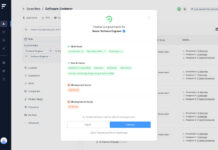
HCM technology customers are done with sales and marketing pitches that tout machine learning, artificial intelligence and the intricacies of other advanced technologies. Instead, they expect vendors to make the case for workable, reasonably priced solutions to the challenges they face in nearly every corner of HR.
Conversations with HCM tech buyers, users and even some solutions providers at this week’s HR Technology Conference revealed a distinct feeling that HR departments now focus their buying decisions on a product’s results as opposed to its underlying technology. While some people labeled terms like “AI” and “machine learning” as buzzwords, others described them as “table stakes.”
“AI’s not new anymore, so it’s not as exciting as it used to be,” said one attendee. “People want to know what’s going on with the software” and the outcomes it produces.
When HR evaluates new tools, their executives don’t ask about technology specifics, added one vendor. “They’re asking about what problems we’re trying to solve.”
#HR pros say #AI isn't new or exciting anymore. They want to know more about the outcomes #HRTech solutions produce. #HRTribe #HCM Share on XBuyers Think About Products and Results
This isn’t to say buyers don’t believe in strong technology solutions anymore. Rather, they don’t want to be educated on the nuts-and-bolts of how a particular product gets the job done. Our conversations might be summarized this way: “Product teams, keep doing what you’re doing. Marketing teams, we’re not listening to the AI speil anymore. It doesn’t tell us anything.”
“HR’s interested in the pain point they need help with and how addressing that pain point aligns with the needs and goals of their organization,” said David Shadovitz, co-chair of the conference and editor of Human Resource Executive. “HR needs to know the process works, but not necessarily how the technology works.”
Jeanne Achille agreed. A spokesperson for the event and conference chair of its Women in HR Tech Summit, she’s recently observed “a shift from technology being a bright shining object to technology solving problems and creating a foundation for the future of work.”
Time to Revisit Messaging
One industry analyst, who asked not to be identified because he was speaking for himself and not his firm, said that like most buzzwords, “AI” is monopolizing vendors’ marketing jargon even as the term’s been spread thin enough to mean things that don’t really apply. That complicates an already vexing issue: Different experts and vendors define artificial intelligence in different ways. (Indeed, many hard-core data scientists argue that what we refer to now as AI is better defined as “sophisticated data processing.”
“We saw this, too, with Big Data,” the analyst remarked. “The fast-and-looseness of a term that eventually evolved to refer to any old big set of data, which isn’t really the definition.” (For the record, most experts define Big Data as extremely large data sets that can be used for analysis, insight and more informed decision-making.)
“To be sure, there are bona fide advances in AI in HR to write home about,” the analyst continued. “The challenge is in sifting through the fool’s gold to find the nuggets of actual AI in the silt.”
“Anytime we have a new technology, it tends to get really noisy,” said Jonathan Goodman, general manager of the San Francisco Bay Area for The Starr Conspiracy, a strategic marketing and advertising agency. “What we counsel is to be really disciplined in your claims.”
AI isn’t a category of software or an outcome in and of itself, Goodman noted. It might be a choice factor or a differentiating attribute, but there’s so much noise around it, “You’ve really got to drill into, ‘OK, what about your AI is differentiating?’”
However, like many of the people we spoke with, Goodman doesn’t believe AI is much of a differentiator anymore. That presents a new challenge to vendors’ marketing teams: “They’ve really got to add some qualifiers to get at what their AI is doing that differentiates their solutions from the competition’s,” Goodman said.
Image: USO















